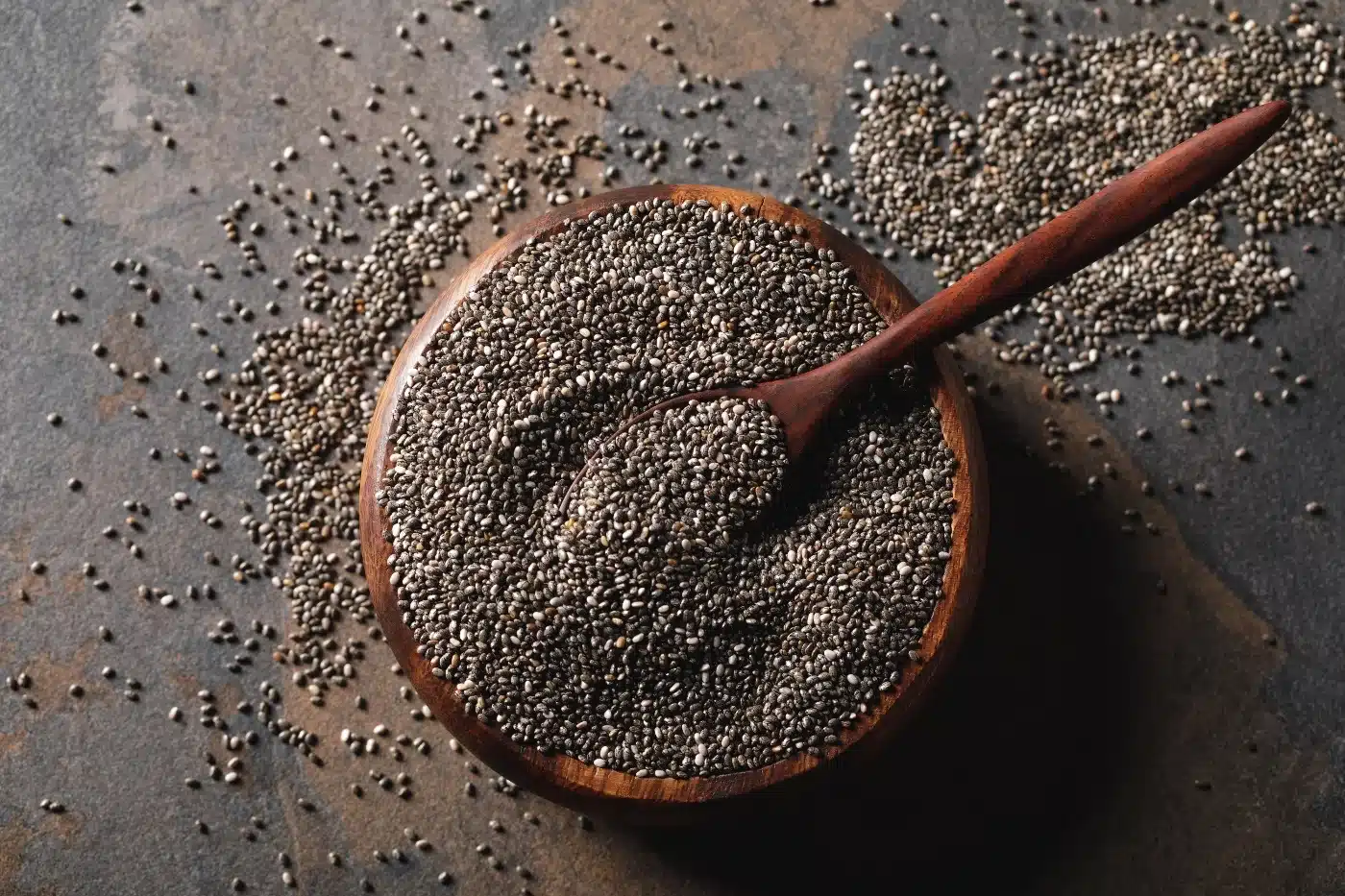I’m always excited to share the incredible health benefits of nutrient-dense foods like chia seeds.
These tiny seeds have been a staple in ancient diets for centuries, and modern science has confirmed their remarkable nutritional value.
I’ve seen firsthand how incorporating chia seeds into a balanced diet can support my clients’ health and well-being.
Key Takeaways
- Chia seeds are packed with essential nutrients, including fiber, protein, omega-3 fatty acids, and various minerals.
- The antioxidants in chia seeds protect the delicate fats and offer potential health benefits, such as reducing inflammation and lowering blood pressure.
- Chia seeds may support weight loss efforts due to their high fiber and protein content, which can promote feelings of fullness and reduce appetite.
- The nutrients in chia seeds, including omega-3s and minerals like calcium and magnesium, may help lower the risk of heart disease and support bone health.
- Chia seeds may help regulate blood sugar levels, making them a valuable addition to a diabetes-friendly diet.
Here’s some helpful information about chia seeds’ seven enticing health benefits, all backed by scientific research.
1. Highly Nutritious
Chia seeds may be small, but they pack an impressive nutritional punch. Just one ounce (28 grams or 2 tablespoons) of chia seeds contains:
- Calories: 138
- Protein: 4.7 g
- Fat: 8.7 g
- Alpha-linolenic acid (ALA): 5 g
- Carbs: 11.9 g
- Fiber: 9.8 g
- Calcium: 14% of the Daily Value (DV)
- Iron: 12% of the DV
- Magnesium: 23% of the DV
- Phosphorus: 20% of the DV
- Zinc: 12% of the DV
- Vitamin B1 (thiamine): 15% of the DV
- Vitamin B3 (niacin): 16% of the DV
2. Loaded With Antioxidants
Chia seeds are an excellent source of antioxidants, which not only protect the sensitive fats in the seeds from going rancid but also offer potential health benefits. Antioxidants help neutralize harmful free radicals that can damage cell compounds and contribute to ageing and diseases like cancer.
The specific antioxidants found in chia seeds include:
- Chlorogenic acid
- Caffeic acid
- Myricetin
- Quercetin
- Kaempferol
These antioxidants may have protective effects on your heart and liver, as well as anticancer properties.
3. May Support Weight Loss
If you’re looking to lose weight, chia seeds could be a valuable addition to your diet. The high fibre and protein content in chia seeds may help promote feelings of fullness and reduce appetite, which can ultimately lead to reduced food intake and weight loss.
One study found that eating chia seeds mixed with yoghurt for breakfast increased feelings of fullness and reduced short-term food intake compared to eating yoghurt without chia seeds.
4. May Lower Your Risk of Heart Disease
The fiber and omega-3 content in chia seeds may help reduce your risk of heart disease. Soluble fibre, the primary type found in chia seeds, can help lower total and LDL (bad) cholesterol levels in your blood, thus reducing your risk of heart disease.
Additionally, consuming ALA, the omega-3 fatty acid in chia seeds, has been linked to a decreased risk of heart disease.
5. Contain Many Important Bone Nutrients
Chia seeds are high in several nutrients crucial for maintaining strong, healthy bones, including:
- Calcium
- Phosphorus
- Magnesium
Observational studies suggest that getting enough of these nutrients is essential for maintaining good bone mineral density, an indicator of bone strength. Plus, the ALA in chia seeds may also play a role in supporting bone health.
6. May Reduce Blood Sugar Levels
Consuming chia seeds may help with blood sugar regulation, possibly due to their high fiber content and other beneficial compounds. Some studies suggest that eating bread containing chia seeds helps lower post-meal rises in blood sugar among healthy adults, compared to eating bread without chia seeds.
As a nutritionist, I often recommend chia seeds to my clients with diabetes or those looking to maintain stable blood sugar levels.
7. Easy to Incorporate Into Your Diet
One of the best things about chia seeds is how incredibly easy they are to incorporate into your diet. They have a fairly bland taste, so you can add them to almost anything without altering the flavour. Plus, you don’t need to grind, cook, or prepare them in any special way.
Some simple ways to enjoy chia seeds include:
- Mixing them into yogurt or oatmeal
- Adding them to smoothies or baked goods
- Sprinkling them on top of cereal or salads
- Using them as an egg substitute or to thicken sauces
FAQs
- How many chia seeds should you eat a day? A common serving size is one ounce (28 g or 2-3 tbsp) of chia seeds. Remember to drink plenty of water to reduce the risk of any digestive side effects.
- What happens if I eat chia seeds every day? Limited research in animals and humans has found that taking chia seeds daily can lead to greater weight loss and bone mineral content. That said, eating too many can cause some side effects, so start with a small dose, like 1 oz (28 g) daily, and make sure to drink plenty of water.
- Can eating chia seeds reduce belly fat? Both animal and human studies show chia seeds may help reduce visceral (belly) fat in certain populations. However, larger, higher-quality studies are needed.
- Is a spoonful of chia seeds a day good for you? A tablespoon of chia seeds is about 0.5 oz or 14 g. This is a very small dose that isn’t likely to cause any side effects. That said, to see any benefits, you might want to consume a little more.
- Can I eat chia seeds if I have a nut allergy? Yes, chia seeds are not nuts and are generally safe for people with nut allergies. However, if you have any concerns, it’s always best to consult with your healthcare provider or a registered nutritionist.
